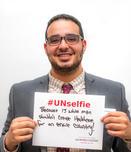
In the cultural climate of #MeToo and #TimesUp, an event hosted by the Women’s Fund of Rhode Island titled Cocktails and Conversations: Feminism is a Male Issue might justifiably raise a few eyebrows. It’s a topic that’s become a favorite quip of late-night comedians -- that men don’t know what they’re even allowed to say to women nowadays, for fear of being accused of sexual harassment.
Beneath the stale one-liners, however, lies a legitimate dilemma: How do we engage men as allies against sexual harassment?
For me, it’s a dilemma best personified by the exposé of Aziz Ansari published last month by the feminist website Babe. In the scenario Babe described, the comedian invited an anonymous woman referred to as “Grace” back to his apartment after a date, where he allegedly pressured her into sexual acts despite her repeated attempts to tell him that he was making her uncomfortable.
Contrary to the outrage against Harvey Weinstein and other celebrities accused of sexual misconduct, the internet reacted to the Babe accusations far less decisively. Many of Ansari’s supporters asserted that Grace wasn’t a victim of sexual harassment -- merely one of miscommunication -- and that her experience with Ansari was simply a bad date, not a cause to vilify him.
In a statement, Ansari said he was “surprised and concerned” to learn that Grace had felt uncomfortable with his behavior, when he believed their sexual interaction “by all indications was completely consensual.” Ansari added that he continues to support #MeToo as a “necessary and long overdue” movement. In fact, according to Babe’s report, it was seeing Ansari wear a “Time’s Up” pin to the Golden Globes that motivated Grace to come forward.
How does that happen? How does a man who’s a self-proclaimed feminist and #MeToo ally find himself accused of sexual assault?
It’s a question I’ve been asked by men of my own acquaintance, trying to reconcile their desire to support the #MeToo movement with their growing sense of frustration: What can men do to be better allies if even “allies” like Aziz Ansari can unwittingly cross the line into sexual misconduct?
The answer, I believe, lies in a fundamental disconnect between how men perceive sexual harassment as a concept and how women experience sexual harassment in reality.
While discussing the Aziz Ansari debacle with a friend, he asked me why Grace didn’t simply leave Ansari’s apartment if she felt uncomfortable. Of course, I don’t know Grace’s reasons, so to answer his question, I asked a few of my own instead.
Had he ever been walking home after dark and felt the need to call a friend or family member, so someone would be on the line if he was attacked? Had he ever given someone a fake phone number or lied about being in a relationship, just to get someone to leave him alone? Had he ever worried about losing his job if he asked his boss to stop making vulgar comments about how he dressed? Had he ever experienced the terrifying certainty that if the person hitting on him at a bar refused to take no for an answer, he would be physically powerless to defend himself?
Unsurprisingly, my friend answered that, no, he’d never experienced any of those situations.
To be clear, this isn’t because men aren’t victims of sexual assault; we know for a fact that they are. A study released last week by the nonprofit Stop Street Harassment found that 81 percent of women in the U.S. said they had experienced some form of sexual harassment or assault in their lifetime -- along with 43 percent of men.
Why, then, are the same men who condemn Harvey Weinstein so reluctant to condemn Aziz Ansari? Because the social, cultural, vocational, and economic disparities caused by gender inequity often expose women in our society to subtler and more pervasive forms of sexual harassment than most men experience.
For most men (especially straight, cisgender white men), the situations I described to my friend are theoretical concepts, not everyday realities. For most men, the idea of living in constant awareness of one’s own vulnerability is so foreign as to seem almost absurd, almost impossible to believe.
For most men, the #MeToo movement is about the Harvey Weinsteins of the world -- men who have committed the illegal act of sexual assault. What women are trying to tell us right now is that, actually, it’s about the Aziz Ansaris, too. And as men and masculine-aligned folks, the best thing we can do to be better allies is to listen.
Breaking down the barriers between concept and reality won’t happen overnight, but if the #MeToo movement has taught us anything, it’s that bringing these questions and discussions into the public eye is a good place to start.
For allies who want to listen, and learn, we hope you’ll join the Women’s Fund for our final event of the month on Wednesday, Feb. 28. Tickets are available now for Cocktails & Conversations: Feminism is a Male Issue.

